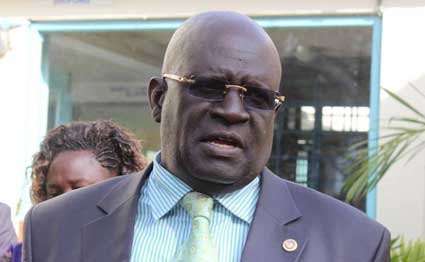BY NT EDUCATION CORRESPONDENT.
No law requires Kenya National Examination Council (KNEC) to involve third parties in marks award.
“We are not legally obligated to invite Kenya National Union of Teachers (KNUT) to participate in the KSCE examination awards and grade setting committee meeting, a technical exercise and neither does KNEC have obligation to consult them or any other party for the awarding and grade setting” KNEC has said.
While defending the 2017 KCSE results, KNEC says that any directive to release marking schemes or marked answer scripts will compromise the security of the national examinations adding that the awards and grade setting of the 2017 KCSE exams was done as per the KNEC awards rules and regulations similar to the previous years.
“The council wishes to categorically state that the 2017 examinations and subsequent investigations were conducted objectively, fairly, in compliance with all laws and regulations and without malice or ulterior motive again any candidate. Last year’s examination results reveal the capabilities of the candidates and the results are credible,” says KNEC CEO Mercy Karogo
In an affidavit, Karogo argues that they conduct all examinations in full adherence to the constitution of Kenya 2010.
KNEC was replying to a case filed by activist Okiya Omtata who wants the examination body compelled to release certified copies of the marked answer sheets of all 2017 candidates.
KNEC argues that it did not isolate nor give special treatment to any candidate or school during the marking and processing or the examination results but treated all students who sat the examination fairly, equitably and equally.
“The allegations and prayers sought for in this petition are intended to interfere with the institutional independence of KNEC, an independent institution mandated to test and assess the quality of education in Kenya,” reads court documents.
KNEC further argue that the rules of 2015 provides in rule 19 that ”examination scripts shall not be accessible to any candidate, institution, teacher or any other third party representing the interest of the candidate once the script has been marked”
Similarly, the court has been told that the awarding and grade setting of the 2017 KCSE exams was determined as per KNEC procedure and reflected the actual performance of the candidates as per their skill, knowledge in their answer scripts and hence did not deny the candidates any chance of University entry.
In the case, Omtatah argues that that by not releasing the marked answer sheets to candidates through their respective schools, the Kenya National Examinations Council is violating the Constitution.
He says that in order for this to be achieved, the process of awarding, collating, and validation of results must be transparent, be of integrity, and accountable.
He further argues that KNEC’s failure to release the marked answer sheets to schools is arbitrary and shrouded in secrecy.
Omtatah says that KNEC has failed to respect, uphold and defend the Constitution of Kenya 2010.
“The release of the answer sheets, as sought by the petitioner, will not compromise the integrity of the examination or the examination process nor infringe on the right of anyone to privacy so as to qualify for exemption under Section 42(2) of the Kenya National Examination Council Act No. 29 of 2012,” Omtatah argues.
Hearing to resume.







